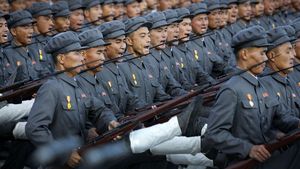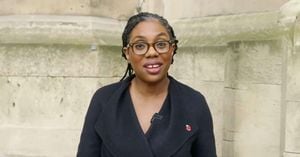ISLAMABAD: Emotions ran high this week as Bushra Bibi, the wife of former Prime Minister Imran Khan, broke down during court proceedings related to the multitude of legal challenges facing her and her husband. The former first lady appeared tearfully before the Islamabad District Magistrate’s court on November 4, 2024, to advocate for bail for her husband, who remains incarcerated following severe sentencing.
At the heart of this dramatic court appearance was Bushra’s outcry against what she described as the "unjust sentencing" of both herself and Khan. "For the past nine months, I've faced injustice from those meant to uphold it. I and the PTI founder were unjustly sentenced," she said, her voice cracking over the sheer weight of her words.
During her emotional plea, Bushra declared, "There is no justice here. I haven't come here to seek justice." Her frustrations were directed not only at the court but also at the inefficiency of her legal representation, stating, "All lawyers, including my own, only waste time." It was evident throughout her address just how trapped she felt by the system.
Further emphasizing her distress, she bemoaned the treatment of her husband, who she claimed was also facing unjust conditions. "The person inside [the prison], isn’t he human? Doesn’t any judge see this?" Bushra lamented as she prepared to leave the courtroom, asserting her decision not to return, stating, "This is not the place for justice." Despite feeling prepared to return to jail—the belongings she would need already arranged outside—her anguish was palpable.
Her latest court appearance came shortly after she was released on bail for another case involving the Toshakhana scandal, where she was accused of mishandling government gifts. The Islamabad High Court had granted her bail recently, but her husband was not so fortunate, remaining detained at Rawalpindi's Adiala prison.
The legal tribulations for the couple began when, on January 31, both Bushra and Imran Khan were sentenced to 14 years based on accusations of retaining and selling state gifts improperly during Khan's premiership. They both vehemently deny any wrongdoing, viewing the charges as politically motivated and part of a broader witch-hunt against prominent leaders from the Pakistan Tehreek-e-Insaf (PTI) party.
Khan’s sentencing has painted him as somewhat of a martyr-like figure among his supporters, who perceive the legal actions as part of the establishment's efforts to stifle dissent and quash political opponents. Their claims of being victimized resonate with many who support Khan’s vision and struggle for democracy.
The court advised Bushra during her hearing, allowing her to apply for bail under several different cases—including allegations filed at Tarnol, Karachi Company, Ramna, Secretariat, and Kohsar police stations—and reiterated the importance of justice within the system. But her insistence on the absence of justice highlighted her disillusionment.
This saga reflects not only the troubles facing one couple but also the growing sense of crisis within Pakistan's judicial and political frameworks—a situation marked by political instability and unrest.
Bushra’s tears and heartfelt appeals serve as symbols of the growing tension and despair felt by many affected by the political climate. She fiercely criticized the court's indifference to her plight and the situation facing her spouse, laying bare the emotional toll the situation has inflicted upon her family.
According to reports, Bushra's tearful statements have evoked sympathy from many, but her added frustrations with the legal system only cloud her court appearances with yet more uncertainty about the future. What lies next for the couple remains to be seen, as their cases continue to draw national and international attention.
Now, with appeals filed, both Bushra and Khan’s legal futures sit precariously with no clear resolution as public opinions sway amid the emotional and political turbulence.
What will become of the couple, and how will their story fit within the larger narrative of Pakistan’s transition from politics to legal battles? Only time will tell, but for now, emotion and politics intertwine deeply within the walls of the courtroom.



